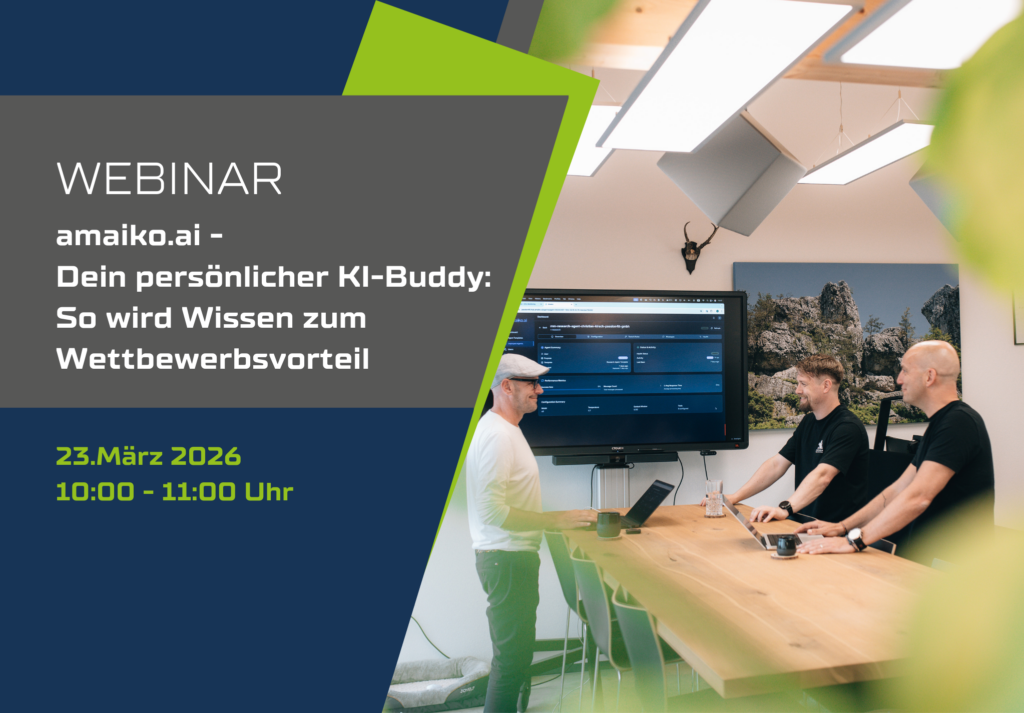Artificial intelligence: opportunity instead of risk
Artificial intelligence (AI) has long been more than just a buzzword from the world of large corporations or tech giants. AI also opens up enormous potential for SMEs - from process optimization and new business models to strengthening competitiveness. However, the step towards using AI still seems like a huge hurdle for many SMEs. The key lies in recognizing the entry hurdles, taking concrete measures and gaining the courage to implement them with practical examples.
Understanding and overcoming barriers to entry
Many SMEs are reluctant to use artificial intelligence. The reasons for this are often a lack of expertise, uncertainty about data protection, limited budgets or fear of costly IT projects. There is a particularly common misconception that AI is only for large companies with huge amounts of data and specialized IT departments.
But this is precisely where the first mistake lies: artificial intelligence today is modular, flexible and scalable. It doesn't need its own research department or budgets in the millions. The decisive factor is the will to take a step-by-step, pragmatic approach. Small projects, clearly defined goals and external experts help to make it easier to get started.
Quick tips: How to get started with artificial intelligence
-
Identify needs: Look at which processes in your company are manual, time-consuming or error-prone. Typical starting points are accounting, customer management, quotation and order processing or warehouse management.
-
Choose small projects: Start with clearly defined, manageable tasks - such as automated invoice capture or AI-based evaluation of customer inquiries.
-
Seek external support: Use the know-how of experts. Many consultancies and IT service providers specialize in SME requirements and offer free initial analyses or pilot projects.
-
Use support programs: There are numerous regional and national funding programs that support the use of AI in small and medium-sized companies, for example through grants or consulting services.
-
Involve employees: Get your team on board at an early stage, provide targeted training and promote an open culture of innovation. The best ideas for AI applications often come from practical experience!
-
Thinking about data protection right from the start: Clarify at an early stage how you can collect, store and use data in compliance with the law. Data protection is not a stumbling block, but a competitive advantage.
Practical examples: AI in SMEs - how it works!
Automated document capture in craft businesses
A family-run electrical installation company was faced with the challenge of processing dozens of invoices and delivery bills every day. With the help of AI-based text recognition, the documents are now read automatically, relevant data is extracted and transferred directly to the digital system. The results: Less paperwork, fewer errors, more time for the core business and significantly faster invoice processing.
Digitizing customer service in mechanical engineering
A medium-sized mechanical engineering company uses an AI-supported chatbot solution to make customer service available around the clock. Customers receive answers to frequently asked questions, can request spare parts or book maintenance appointments at any time. The workload for service staff is noticeably reduced - and customer satisfaction increases.
Predictive maintenance in production
A manufacturer of precision parts relies on predictive maintenance: sensors constantly record machine data, an AI analyzes it and recognizes when a failure is imminent. This means that maintenance is planned in good time, unplanned downtime is avoided and productivity is maximized. Investments in expensive emergency repairs are a thing of the past.
Dispelling the myths: AI is also feasible for small companies
Many fear that AI could jeopardize jobs or be too complicated in day-to-day operations. The reality is different: AI primarily takes over monotonous, repetitive tasks and frees up employees for creative, challenging activities. The introduction should always be seen as a partnership project with the team.
There are also already many ready-to-use AI solutions that can be integrated without major IT changes: From accounting software and smart warehouse management to marketing tools with AI support. Getting started is easier if the goal is clearly defined and small steps are taken.
How to create an AI culture
Sustainable success depends not only on the technology, but above all on the corporate culture. If you establish an open error culture, encourage experimentation and make successes visible, you will take the fear out of AI. Sharing ideas with other companies that have already gained initial experience helps to avoid mistakes and learn from each other. Networks and local initiatives offer a good platform for this.
Conclusion: It's time to just get started!
Artificial intelligence is not rocket science, nor is it a short-term trend. If you gain initial experience early on and make targeted investments, you will lay the foundations for sustainable growth and innovation. Start with small projects, use external support and create a culture that promotes change and learning. This will turn AI from a buzzword into a real opportunity - even for SMEs.
Book now your non-binding and Free strategy meeting with us.


